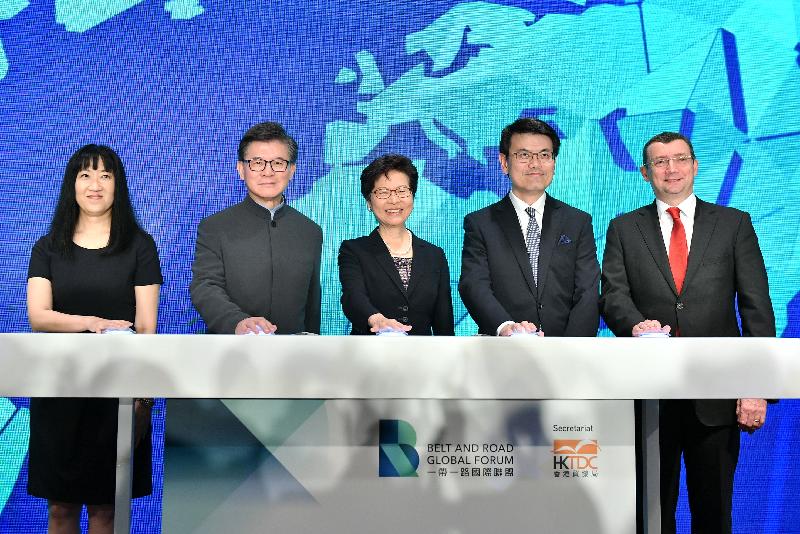Following is a question by the Hon Chan Han-pan and a written reply by the Secretary for Development, Mr Michael Wong, in the Legislative Council today (June 27):
Question:
In April this year, a serious lift accident occurred in a housing estate, causing injuries to two residents who needed to be sent to hospital for treatment. It is learnt that lift contractors often have difficulty in keeping aged lifts under proper repair and maintenance because they are unable to source parts, thereby posing safety hazards. As at the end of last year, 20 430 out of the some 66 200 lifts across the territory were more than 30 years old. In this connection, will the Government inform this Council:
(1) regarding the Integrated Building Maintenance Assistance Scheme, the Building Maintenance Grant Scheme for Elderly Owners and the Building Safety Loan Scheme, of the respective numbers of applications involving lift repair and maintenance or replacement works (i) received and (ii) approved by the authorities in each of the past five years; in respect of the approved applications, of the respective total numbers of lifts involving (iii) replacement and (iv) repair and maintenance/parts replacement, and (v) the total amount of funding granted (set out in tables of the same format as the table below);
Name of scheme:
| Year |
(i) |
(ii) |
(iii) |
(iv) |
(v) |
| 2013 |
|
|
|
|
|
| 2014 |
|
|
|
|
|
| 2015 |
|
|
|
|
|
| 2016 |
|
|
|
|
|
| 2017 |
|
|
|
|
|
(2) of (i) the number of staff members of the Electrical and Mechanical Services Department responsible for lift inspections and (ii) the number of such inspections conducted by them, in each of the past five years;
(3) as some lift repairmen have pointed out that manpower shortage has resulted in them having to work overtime excessively and long working hours have caused recruitment difficulties, thereby creating a vicious cycle, of the measures the authorities have in place to encourage new blood to join the trade; and
(4) as the authorities have indicated that they will, by making reference to the approach adopted in schemes such as the Operation Building Bright 2.0, allocate funding to subsidise property owners in need to carry out lift repair and maintenance or replacement works, of the implementation timetable of the relevant scheme; apart from providing subsidy, the measures the authorities have in place to encourage lift owners to replace aged lifts expeditiously?
Reply:
President,
The operation of lifts in Hong Kong is regulated by the Lifts and Escalators Ordinance (Cap 618) (the Ordinance), which was put into operation on December 17, 2012, to replace the repealed Lifts and Escalators (Safety) Ordinance (Cap 327). The Ordinance introduces a series of new and enhanced regulatory measures including stipulating clearly the responsibilities of the Responsible Person (i.e. owner of the lift/escalator and any person who has the management or control of the lift/escalator), the Registered Contractor, the Registered Engineer and the Registered Worker. Since the Ordinance came into operation, the number of incidents that must be reported to the Electrical and Mechanical Services Department (EMSD) involving failure of lift and escalator equipment has been remarkably reduced as compared with that before the Ordinance was put in effect, with a reduction of 72 per cent from an average of 28 cases per year in 2010 to 2012 to an average of 7.8 cases per year in 2013 to 2017. The EMSD will continue to strictly enforce the Ordinance and is committed to introducing various measures to enhance the safety of aged lifts, so as to ensure that the public can enjoy safe lift services.
Our reply to the question raised by the Hon Chan is as follows:
(1) At present, the Government has made available financial assistance to owners of private buildings in need to modernise or replace their lifts. These include the Integrated Building Maintenance Assistance Scheme provided by the Urban Renewal Authority (URA), the Building Maintenance Grant Scheme for Elderly Owners administered by the Hong Kong Housing Society (HKHS) under the Government’s entrustment and the Building Safety Loan Scheme provided by the Buildings Department (BD).
The URA, HKHS and BD do not compile statistical information regarding the number of applications received or approved involving repair and maintenance/parts replacement or replacement of lifts and the corresponding total number of lifts. However, the Government notices that owners may tend to use such financial support on the maintenance or improvement of other common areas based on the conditions of the buildings rather than on the lift modernisation works. In the past five years, the information of applications processed by the URA under the Integrated Building Maintenance Assistance Scheme, by the HKHS under the Building Maintenance Grant Scheme for Elderly Owners, and by the BD under the Building Safety Loan Scheme is set out at the Annex.
(2) The EMSD attaches great importance to lift and escalator safety, and has set up a dedicated team responsible for regulating lift and escalator safety throughout the territory. In the past five years, the numbers of staff members in the team are 26 (Year 2013-14), 36 (Year 2014-15), 36 (Year 2015-16), 27 (Year 2016-17) (Note 2) and 34 (in 2017-18)(Note 3). The numbers of inspections conducted by them in the past five years are as follows:
| Year |
2013 |
2014 |
2015 |
2016 |
2017 |
| Number of lift inspections |
9 258 |
10 850 |
10 090 |
8 808 |
8 801 |
| Number of escalator inspections |
1 306 |
1 423 |
1 708 |
1 363 |
2 430 |
| Total |
10 564 |
12 273 |
11 798 |
10 171 |
11 231 |
In 2018-19, the EMSD has increased the manpower of the dedicated team to 43 staff members, in order to strengthen the inspections of aged lifts. The EMSD will make greater efforts to inspect the maintenance and examination of lifts, in particular those components which may affect the safe operation of lifts. It is expected that the number of inspections this year will increase to about 14 000, i.e. an increase of 25 per cent. In addition, regarding the new series of measures which are to be implemented in the future, the EMSD will further examine the manpower requirements to cope with the additional workload.
(3) The EMSD has been closely monitoring the manpower situation of the market. Apart from maintaining close communication with the industry, the following series of measures have been implemented in recent years to attract more new blood to join the industry:
– The Vocational Training Council (VTC) and the Construction Industry Council (CIC) jointly introduced the “Earn & Learn” Scheme in 2014. The number of new apprentices enrolled each year has increased remarkably, from about 70 in the past to more than 200 in 2015 and more than 250 in both 2016 and 2017;
– In 2016, the VTC and the HKU School of Professional and Continuing Education launched two different courses related to lift and escalator for the practicing workers to acquire the required academic qualifications to meet the registration requirements of Registered Workers;
– The CIC has implemented the “Contractor Cooperative Training Scheme” for the Electrical and Mechanical (E&M) trades (including lift and escalator mechanics) to provide financial support to those who wish to join the lift and escalator industry;
– Since 2016, the EMSD has started to invest more than $600 million in recruiting over 1 000 technician trainees in five years to provide new blood for the entire E&M industry (including lift and escalator trade) to cope with future challenges; and
– In early 2018, the EMSD collaborated with the industry to produce a promotional video to attract newcomers to the industry. Production of the video has been completed, which has been uploaded onto the department’s website for public viewing.
In light of the fact that more new blood have joined the industry in the past three years and most of them are still undergoing apprenticeship training, these apprentices are expected to graduate in the next two to three years and join the industry.
(4) Lifts must have proper periodic examinations and maintenance to ensure their safe use. However, as the lifts get aged, the maintenance problems encountered will increase in terms of number and complexity. Owing to rapid technological advancement in recent years, modern lifts are equipped with more comprehensive safety devices than the aged ones. There are thus rooms for improving and enhancing aged lifts from the lift safety perspective. In view of this, the EMSD promulgated “the Guidelines for Modernising Existing Lifts” in 2011, which aims at recommending the Responsible Persons to install safety devices (including the unintended car movement protection device) for their aged lifts to make the lifts safer, more reliable and comfortable.
As of the end of 2017, there were about 66 200 lifts in Hong Kong, of which about 80 per cent were not equipped with safety devices of the latest standard. Owing to the fact that the lift modernisation is carried out on a voluntary basis, modernisation works of different level have been carried out to about 5 200 lifts since 2011. The progress is not remarkable.
As we briefed Members at the meeting of the Legislative Council Panel on Development on May 29, 2018, the Development Bureau (DEVB) and the EMSD are actively formulating short-term, medium-term and medium to long-term measures to enhance the safety of aged lifts, thereby further protecting public safety:
Short-term measures: The EMSD will step up its surveillance checks of the maintenance and examination of lifts, in particular those components that may affect the safe operation of lifts. At the same time, the department is also studying how the Responsible Persons and contractors can strengthen the maintenance of aged lifts that have not yet been modernised.
Medium-term measures: The DEVB and the EMSD will consider the feasibility of allocating funding to subsidise those owners in need by making reference to the on-going “Operation Building Bright 2.0 Scheme” and “Fire Safety Improvement Works Subsidy Scheme”, and providing them with appropriate professional support, so as to encourage them to speed up the lift modernisation works.
Medium to long-term measures: The DEVB and the EMSD will study the feasibility of mandating the lift modernisation works in phases. In this regard, we will make reference to the practices of other countries, and take into account the impact on the community and the trade.
We will brief Members on the details of the new measures as soon as possible, especially the subsidy scheme related to the medium-term measures.
Note 1: In accordance with the Ordinance, the Responsible Person for a lift must notify the Director of Electrical and Mechanical Services of the following lift incidents:
(i) A person dies or is injured and the death or injury involves a lift or any associated equipment or machinery of a lift;
(ii) A failure of the main drive system of a lift;
(iii) A breakage of any suspension rope of a lift;
(iv) A failure of any brake, overload device, safety component or safety equipment of a lift; or
(v) A failure of any interlocking device for any door of the lift-way of a lift.
Upon receiving notification of the above lift incidents, the EMSD will arrange on-duty staff for an investigation as far as practicable.
Note 2: The increase of staff members in Year 2014-15 and Year 2015-16 was based on risk assessment, requiring more staff members to enhance inspections of lifts/escalators. The number of staff members in Year 2016-17 resumed to its normal level.
Note 3: The increase of staff members in Year 2017-18 was due to the continuous increase in number of lifts and escalators, so as to maintain the level of control on lift and escalator safety.
read more



